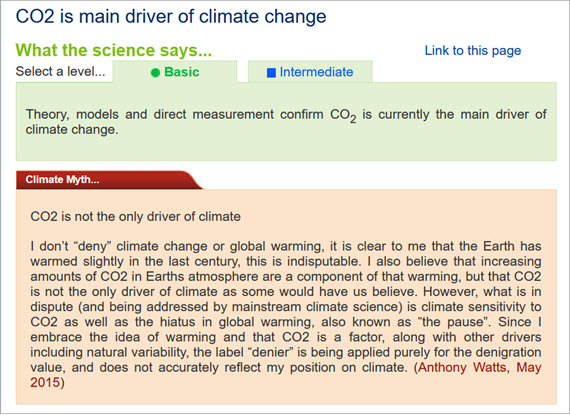
On February 14, 2023 we announced our Rebuttal Update Project. This included an ask for feedback about the added "At a glance" section in the updated basic rebuttal versions. This weekly blog post series highlights this new section of one of the updated basic rebuttal versions and serves as a "bump" for our ask. This week features "CO2 is the main driver of climate change". More will follow in the upcoming weeks. Please follow the Further Reading link at the bottom to read the full rebuttal and to join the discussion in the comment thread there.
It may come as a surprise to some people unfamiliar with climate science, but tracking down anyone who actually said, "CO2 is the only driver of climate change", has proved most elusive. Thus, the idea that, "CO2 is not the only driver of climate as some would have us believe.", is lacking something rather important. Who actually said it?
In climate science, nobody ever said it. That's because climate science covers everything that affects the climate. If you don't include everything, it would be like trying to find out how an internal combustion engine-powered car works, using as an example one without a crankshaft. The talking-point looks more like an example of a straw man fallacy, in which an argument, claim, or opponent is invented, and then shot down in flames, point-scoring being the idea. One sees this a lot in politics, but not in science.
Through science, we know that Earth's climate is affected by a myriad of drivers that operate on timescales varying from seasons to tens of thousands to tens of millions of years. We've investigated them in depth and we continue to do so. We understand which ones act as 'radiative forcings' - the external, independent primary drivers that determine whether energy is being added to or removed from the system. We likewise understand which ones act as 'feedbacks' - secondary drivers that determine how energy is moved around within the system.
The very nature of science is that it is an ongoing self-correcting process in each and every discipline. So we do understand the key forcings and feedbacks that operate within our climate and on what time-scale they occur. CO2, along with the other greenhouse gases, is but one of these factors.
Before you get too relaxed, however, of all the variables out there, CO2 is the one that has seen a huge change. Since pre-industrial times its concentration has gone up by a whopping 50%. Just imagine if a change of that amount occurred with another part of the climate system. How about the strength of sunlight going up by 50%?
Ironically, at the time of writing (early 2024), there is a lot of discussion as to why 2023 was so warm. The heat came on particularly in the second half of the year, coinciding with the onset of strong El Nino conditions in the Pacific Ocean. But normally there's a lag between El Nino starting up and peak temperatures. Did the injection of unusual amounts of water vapour into the upper atmosphere by the Hunga Tonga-Hunga Ha'apai volcano have a hand? Possibly. Did the cleaning-up of sulphate aerosol-generating shipping fuels partially remove a well-known negative or cooling feedback, and if so by how much?
The trouble is that scientific investigations involve a lot of careful hard work and that takes a lot of time. For people more used to the instant answers of politicians, that might be disappointing, but there's a difference. Science requires evidence, politics less so.
Please use this form to provide feedback about this new "At a glance" section. Read a more technical version below or dig deeper via the tabs above!
In case you'd like to explore more of our recently updated rebuttals, here are the links to all of them:
If you think that projects like these rebuttal updates are a good idea, please visit our support page to contribute!
Posted by John Mason on Tuesday, 4 June, 2024
 |
The Skeptical Science website by Skeptical Science is licensed under a Creative Commons Attribution 3.0 Unported License. |